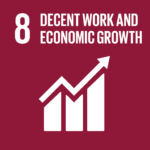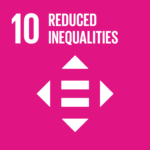From continued improvements to the rise of ‘citizen developers”, 2022 will be a year of big responsible tech.
The biggest shaping influence of 2021 was the global pandemic and associated efforts around protection of lives and well-being, social justice, and climate emergency. As we hit 2022 running, I wanted to break out our crystal ball to see what 2022 will bring for the technology in our lives. Some of the changes we’ll talk about are long overdue. Some of them build on the progress or improvement seen in 2021. I gathered around 5 forecasts for 2022 that will inevitably be yet another challenging, but exciting year ahead.
RELEVANT SUSTAINABLE GOALS




1. Citizen Developers Movement & Low-Code / No-Code Solutions
2022 will witness an increase in low-code/no-code solutions and the advent of the citizen developer movement. Access to enterprise-grade technology has become more affordable, allowing businesses of all sizes to upgrade. Similarly, access to purpose-built solutions developed for a company’s specific use cases will enable employees to discover problems and execute and iterate solutions to data and process obstacles.
2. Ethical AI
While AI technology offers several advantages, it also poses issues and threats to humans regarding data security, data privacy, and digital ethics. Therefore, the tech sector will continue to debate and adopt shared ethical concepts, rules, laws, and regulations to ensure that AIs produced in the future will behave ethically.
3. Transparency, Governance and Accountability
We humans must be able to trust technology for it to function. Unfortunately, we already see (rightly) considerable pushback against many current uses of technology that are perceived as invasive, hazardous, or irresponsible. Security breaches, data privacy issues, and AI whistleblowers dominated technology news in 2021.
According to Forrester’s research, companies will try to regain lost trust in 2022 with various tactics, including creating high-ranking roles in charge of “digital trust,” offering cash rewards to people who identify bias in AI systems and adopting technologies that partially anonymize personal data.
4. ESG Integration and Sustainable Energy Solutions
As the warning bells of climate change ring louder, technology and digitalization will come to our help in 2022. People worldwide are realizing the need to take action to combat climate change and environmental deterioration. Green clouds, the war for efficiency, and climate enlightenment via digital micro degrees and greenfluencers are just a few of the themes that will usher in a more sustainable future.
Overall, the cost of generating renewable energy from diverse sources, such as onshore and offshore wind, solar, and tidal, has decreased by seven to sixteen percent. This will be highly beneficial to nations and corporations attempting to meet emissions objectives, such as carbon neutral or carbon negative. In addition, intriguing new developing energy sources such as biofuels, liquid hydrogen, and nuclear fusion are becoming increasingly realistic. Even if the full impact of some of these may not be seen until around 2022.
5. Tech Equity Moves Beyond Gesture
Many of us dislike the word “DEI” (which stands for “diversity, equality, and inclusion”) since it has become a marketing slogan for some. So instead, we’re figuring out how to do things differently to better address how technology might be used to impose inequality. There are already several shining examples of initiatives in the works. Researchers, activists, and journalists are investigating how big data and artificial intelligence (AI) may help in these endeavors.
For example, Dr. Timnit Gebru, who was sacked from Google’s ethics in AI team, has established the Distributed AI Research Institute (DAIR) as a platform for independent, community-rooted AI research outside of Big Tech’s ubiquitous influence. DAIR conducts Artificial Intelligence (AI) research to remove risk and damage from data. They believe in conducting research from the ground up. They made their findings available to and understood by impacted populations, not just a select few.
By the end of the day, technology reflects the people that create it. For this reason, the teams working on this technology must be varied. In addition, it ensures that technology reflects the overall population in terms of gender, ethnicity, age, geography, experience, education, and interests, among other things.
The article was initially published on 19th January 2022.


